 Former Germany international, Gerald Asamoah
Former Germany international, Gerald Asamoah
Ghanaian-born former German international Gerald Asamoah says it is time to eliminate racial discrimination through football.
Asamoah, the first player to be born in Africa to represent Germany, insists football has the power to unite people regardless of their race.
Racism has been a canker to sports and has in recent times seen an upsurge through social media.
However, there have been campaigns against it.
Asamoah who was speaking to FIFA.com opened up on his own experience and the way forward.
"I’ve always said that you won’t change much if you don’t speak up. I’ve faced a lot of negativity and I tried to stand up to it. It’s hard to reach people who unfortunately already think in a discriminatory way, but young people who are the next generation and don’t have prejudices need to be set an example that we’re all the same, regardless of skin colour. That’s what I’ve always tried to pass on,” he said.
"The worst time was after the 2006 World Cup. I actually had the feeling that I was completely accepted and really belonged. After all, the team had been successful at the World Cup. But suddenly, a couple of weeks later I had a game with Schalke and I was jeered in the stadiums and insulted with the ‘n’ word – even from the same people that had been cheering me on just a few weeks earlier. That really hurt me a lot. It was a step back that I was incredibly disappointed about,” he added.
The former Schalke O4 attacker made 43 appearances for the German national team and played over 300 games in the Bundesliga before hanging his boots.
According to Asamoah, football's power to unite can be used as a tool to fight racial discrimination.
“Football has the power to unite. Everyone knows the game and everyone can play it, regardless of their background. As soon as you start, you have a common goal right away – to be successful. Football helped me a lot when I moved to Germany from Ghana at the age of 12 because it gave me contacts to people straight away. Obviously, I had my family as well, but thanks to football I was able to learn about the other culture first hand and I was immediately accepted as part of the community by my new teammates. That’s why I’m very grateful to football and I know full well that I wouldn’t have had opportunities to be where I am now without it,” he told FIFA.com.